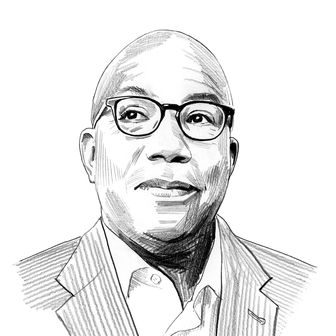
One of the most striking themes of the Democratic National Convention was the way the message flipped back and forth between grim warnings that democracy is under attack and playful invitations to engage in a politics of joy. Democrats at times seemed to be attempting a tricky tightrope act, akin to inviting people to dance their way out of a burning house.
For most of the convention, the message seemed to be: Join the fight to save democracy–and let’s have some fun while we do it. It’s an audacious strategy that President Biden could have never pulled off.
The address by ex-President Bill Clinton was a perfect example. “We’ve seen more than one election slip away from us when we thought it couldn’t happen, when people got distracted by phony issues or overconfident. This is a brutal, tough business,” he told the crowd, before concluding a few minutes later: “We need Kamala Harris, the president of joy, to lead us.”
Over and over, joy and happiness were the theme of cheerful celebrities and upbeat optimists who took the stage at the United Center in Chicago, including comedians Julia Louis-Dreyfuss, Kennan Thompson and Mindy Kahling, poet Amanda Gorman and songsters John Legend, Stevie Wonder and Sheila E. But alongside the fun and funny artistic voices were plenty of speakers like Rep. Bennie Thompson of Mississippi, who solemnly invoked the January 6 insurrection and the need to take seriously threats by Donald Trump to terminate the Constitution, be a dictator on Day One and pardon convicted January 6 rioters if elected.
“In this life, my father never cast a vote because of Jim Crow, so I dedicated my career to protecting the votes against violence and discrimination. You can imagine what I felt on Jan. 6 when I saw with my own eyes those insurrectionists trying to take that away,” Thompson told the crowd. “They did it to rob millions of Americans of their votes.”
“Trump tried to destroy our democracy by lying about the election and inciting a violent mob to attack the Capitol,” Rep. Hakeem Jeffries said from the podium, before shifting into a preacher’s cadence and drawing cheers: “In the Old Testament Book of Psalms, the scripture tells us that weeping may endure during the long night, but joy will come in the morning.”
The Rev. Al Sharpton quoted the same Biblical passage in his remarks. “We’ve endured lies and areas of darkness,” he said. “But if we stay together, Black, white, Latina, Asian, Indian American, if we stay together, joy, joy, joy, joy coming in the morning.”
And surprise guest Oprah Winfrey saluted podium speakers who’d told wrenching personal stories about rape, incest and medical trauma caused by restricted access to abortion before doing the pivot. “We won’t go back. We won’t be sent back, pushed back, bullied back, kicked back. We’re not going back, “ she said, before singing out the J-word: “So let us choose. Let us choose truth, let us choose honor, and let us choose joooooooy!”
So which is it? Are Democrats waging a desperate fight against a would-be dictator, or trying to have a good time? “It’s not a campaign theme,” Quentin Fulks, deputy campaign manager for the Harris-Walz ticket, told columnist Lynn Sweet of the Chicago Sun-Times about the j-word. “It’s just something that they’re doing, that they’re bringing to the table. I think if you try to manufacture something like joy, it can go wrong because it’s fake. I think the reason why it’s resonating with people is because it’s authentic.”
Harris notably did not utter the world “joy” even once in her prime-time address that concluded the convention. Instead, she listed Trump’s attacks on democracy. “Consider not only the chaos and calamity when he was in office, but also the gravity of what has happened since he lost the last election,” Harris said in the stern, persuasive tones of the courtroom prosecutor she once was. “Donald Trump tried to throw away your votes. When he failed, he sent an armed mob to the U.S. Capitol, where they assaulted law enforcement officers. When politicians in his own party begged him to call off the mob and send help, he did the opposite — he fanned the flames.”
Harris, it seems, is not going to downplay or ignore the reality that America in the age of Trump has been flirting with open attacks on democracy. But she should consider embracing the politics of joy—not only because her followers like it, but because expressions of love and happiness have a proven track record of dissolving the dark power of dictatorship.
I recently talked about the phenomenon with Ruth Ben-Ghiat, a historian at New York University whose book Strongmen examines how authoritarian strongmen gain power — and how they lose it. While Trump is an uncomfortably good fit with the likes of Hungary’s Viktor Orbán, India’s Narendra Modi and Russia’s Vladimir Putin, says Ben-Ghiat, many of today’s strongmen are encountering a wave of popular resistance around the world.
“There’s a big movement of anti-authoritarianism building around the world, and we are in the middle of a renaissance of nonviolent protest around the world. And there are places that have had the biggest protests they’ve ever had, or in the last 40 years, like in Poland, in Chile, in Israel,” she told me. “You could name 10 other countries that have the biggest protests they’ve ever had, because there is something changing in the world. And so one of my maxims is to always have hope.”
In Turkey, says Ben-Ghiat, the politics of love was the most potent weapon available to push back against the creeping authoritarianism of that country’s strongman, Recep Tayyip Erdoğan. “One of my Democratic heroes is Ekrem İmamoğlu,” she said, referring to the Mayor of Istanbul. “He ran for office in 2019 on a platform of love. And instead of having rallies, he walked around and hugged people. The total opposite of Erdogan. And he won.”
It’s possible that the new politics of joy will continue the activism of the recent past – the women’s march in 2017, the Black Lives Matter demonstrations following the killing of George Floyd in 2020, and this year’s elections – as part of a larger movement to invigorate democracy.
“Never give up on the American people. There’s a lot of decency. There’s a lot of people we don’t hear,” Ben-Ghiat says. “A lot of it’s behind the scenes. There are a lot of people working to safeguard our democracy right now.”






























